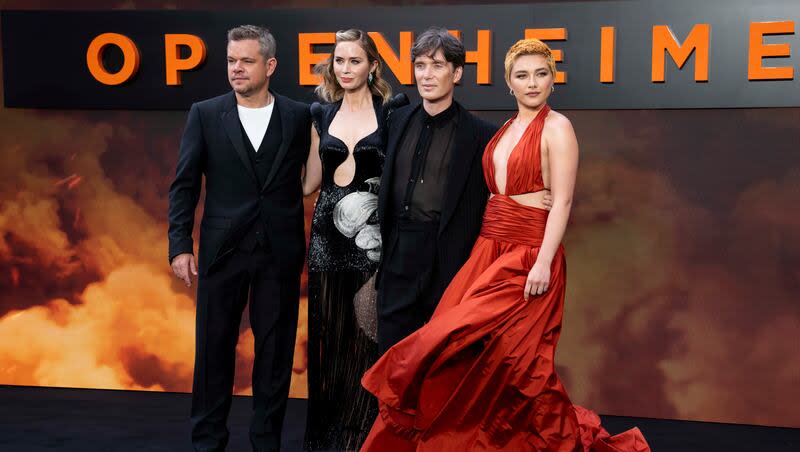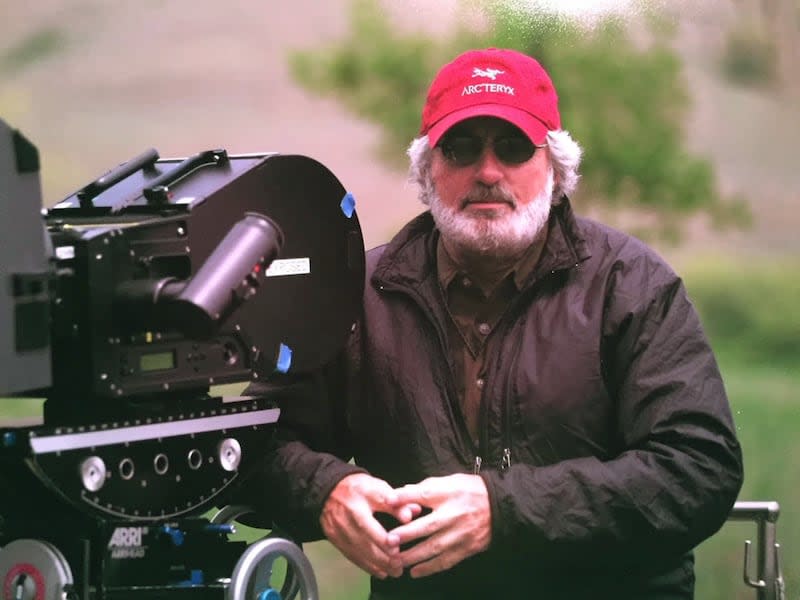How I’ve come to terms with ‘Oppenheimer’ likely sweeping the Oscars

- Oops!Something went wrong.Please try again later.
- Oops!Something went wrong.Please try again later.
I find myself in a sour mood anytime I think about the upcoming Academy Awards telecast on Sunday. “Oppenheimer” — Christopher Nolan’s three-hour biopic on the creator of the atomic bomb — is predicted to sweep most, if not all, of the 13 categories in which it is nominated. And that makes me mad.
I did not care for “Oppenheimer.” I thought it was an hour too long, unnecessarily convoluted, devoid of emotional impact and too self-important. It is my least favorite of the best picture nominees I’ve seen, and I believe a smaller, more contained and more emotionally affecting film like “Past Lives” or “Zone of Interest” is deserving of the recognition that “Oppenheimer” will likely receive.
As a film lover and competitive person, I tend to get a little too invested in the Oscars, and even take it personally when my favorite films are not given the love I want them to receive. So to stave off grumpiness, I have to remind myself to take a step back and remember that art is subjective, there isn’t one definitive truth about what makes a movie good or bad, and that the Academy Awards are simply a reflection of how members of a particular voting body fill out their ranked choice ballots.
But I still often wonder how I can have such a different mentality than the majority of those nearly 10,000 Oscar voters.
Luckily, I know one of them, so I reached out to get some answers.
Reed Smoot is a Utah-based cinematographer known for his work on “Homeward Bound” and a number of IMAX films, including “Jerusalem” and “Jane Goodall: Reasons for Hope.” He has been a member of the Academy of Motion Picture Arts and Sciences for the past 20 years, having been nominated by producer and director Bob Rogers of BRC Imagination Arts, with whom he collaborated on two films that made the Oscars short list. He was selected to join the academy after presenting his work before a delegation of members who voted to induct him. Smoot was kind enough to spend a half-hour explaining the Oscar voting process to me, and the mentality he employs while completing his ballot.

A few years ago, voting moved from paper ballots to an online system, Smoot explained. Using unique coded IDs, voters are able to access and watch the films. Then, after registering to vote, they are sent a one-time digital code to access their ballots. Members completed their ballots between Feb. 22 and 27.
Smoot agreed that “Oppenheimer” will likely sweep, and believes that this is, in part, due to how the movie was marketed. By releasing the film the same day as “Barbie,” he explained, Universal created the “Barbenheimer” phenomenon that made both movies appeal to the masses. Many of the other best picture nominees do not have the same broad appeal, or at least were not marketed to the general public as effectively.
Smoot reminded me that the awards are meant to recognize achievement in categories. He described “Oppenheimer” as technically “extremely well done” and commended Nolan’s obsession with detail. He also praised the “Oppenheimer” team’s ability to accomplish what they did on a $100 million budget.
Much of who or what wins an award comes down to the timing of the film’s release, the buzziness of its stars and the overall climate of the industry, Smoot told me. In what is perhaps the closest race of the season — the best actress category — Smoot predicts that Lily Gladstone, the star of “Killers of the Flower Moon,” will win over Emma Stone, who stars in “Poor Things,” because of Gladstone’s momentum through the Oscar campaign season, the media attention she has received and her previous wins at the SAG and Golden Globe awards, compared to Stone’s more muted presence the last few months.
Ultimately, he said, it’s nearly impossible to compare many of this year’s movies and performances. “How do you compare Bradley Cooper’s performance as Leonard Bernstein in ‘Maestro’ to Cillian Murphy’s performance as Robert J. Oppenheimer in ‘Oppenheimer’?’” he asked. It’s nearly impossible to deem one performance better than the other when they’re so different.
So why have these awards at all if it’s all so subjective, I asked him.
The Oscars are important for the perpetuation of the industry, he explained. He added that the awards show bestows prestige and mystique in the movie-making business. But sometimes, winning an Academy Award turns out to be a curse for the recipient. Famously, after Marcia Gay Harden won an Oscar for her role in “Pollock,” she struggled to find meaningful acting work. “Suddenly the parts you’re offered become smaller and the money less. There’s no logic to it,” she later said, and called the win “disastrous.” Also, after winning an Oscar for “Life is Beautiful,” Robert Benigni’s “Pinnochio” received a 0% rating on Rotten Tomatoes.
Smoot has known other Oscar winners whose careers fell apart after their win instead of the award giving them the expected boost. Some lived the rest of their lives in obscurity, desperate for work.
That’s not what I want for my favorite films. I want the filmmakers behind them to continue to make art that moves and inspires. Maybe someday their art will be awarded with an Oscar. Or maybe it won’t. But the award itself, it seems, will ultimately have little impact on their career trajectory.
So while I can’t help but hope for big awards for “Zone of Interest,” the Holocaust movie that brilliantly demonstrated the banality of evil, or “Past Lives,” which moved me more than any film has in a decade, I can at least sleep at night knowing that my favorite filmmakers of 2023 won’t have a curse hanging over their careers and are sure to deliver much great cinema in years to come.
The Academy Awards show starts at 5 p.m. MDT — an hour earlier than in previous years — and will air on ABC.

